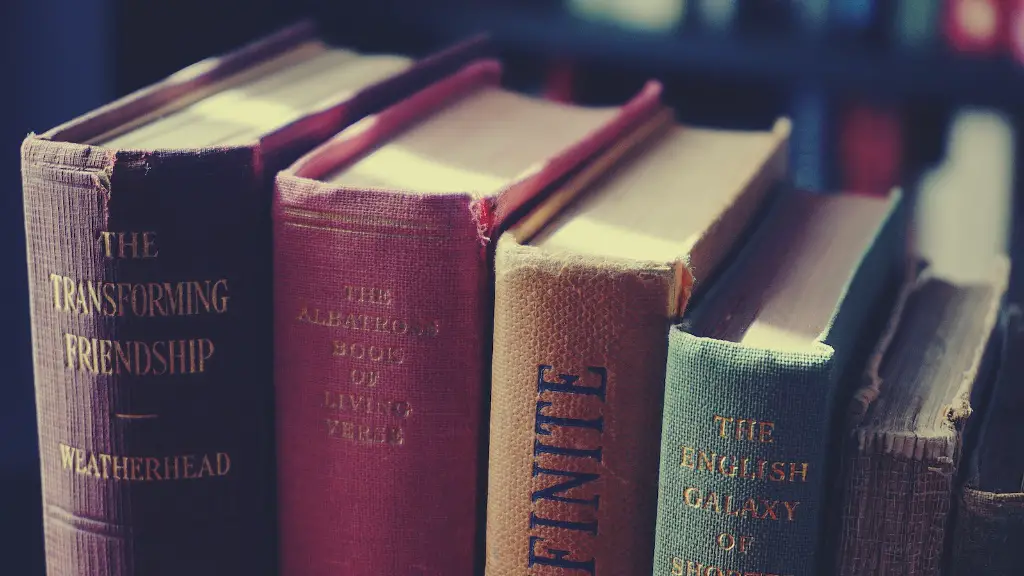What is poetry?
Poetry is an ancient art form of writing with language. It is often described as the art of expressing ideas and feelings in an imaginative, rhythmic way using words and language. It is a form of literature that utilizes language in a manner that is outside of the ordinary, be that the structure of sentences, the choice of words, or the flow of the message.
In general, poetic works tend to contain a creative mix of literary devices and visual elements such as metaphor, rhythm, rhymes, stanzas, and personification. The art of poetry has been around for centuries and has developed throughout the ages.
History of Poetry
The earliest record of poetry is found in the oral tradition of ancient cultures and extends back over several millennia. While its origin is uncertain, many suggest that it had its beginnings in the expression of ideas, emotions, beliefs, and ways of life that were specific to its time and culture.
Ancient Sumerian and Egyptian cultures have recorded some of the earliest poetry, which was often used to tell stories or express emotions. Ancient Greek culture saw the rise of the epics and poetry of Homer, Hesiod, and Pindar. These works have had a lasting influence on poetry, and many modern works are modeled after them.
In antiquity, poetry was often performed at festivals and religious ceremonies, where performers would recite the poems aloud with music accompanying them. This practice is still alive in some cultures today.
Poetry as a Form of Art
Throughout history, poetry has been used by writers and storytellers to share ideas, communicate emotions, and create a feeling of beauty in the words. It is an expressive art form that is unique in its ability to use words to evoke a sense of wonder, emotion, and even mystery in the reader.
Poetry has a long-standing tradition in many cultures, and poets often use their works to explore social and political issues as well as to comment on the human condition. In modern times, many people use poetry as a way to express themselves and create art that speaks to their personal experiences.
The Impact of Poetry on Culture
The influence of poetry can be seen in many aspects of culture around the world. Poetry has inspired art and music, been used in entertainment, and has had a significant impact on literature. It has also been employed in political and social discourse, as well as to celebrate moments of joy and sorrow.
Its ability to express emotion in a powerful and artistic manner has made it a popular form of expression for many centuries. This is why it continues to be used to express ideas and feelings about the world around us.
Where Was Poetry Invented?
The answer to this question is not easily answered as poetry has most likely existed in some form since writing itself was developed. However, its exact origin is hard to pinpoint. As previously mentioned, ancient Sumerian and Egyptian cultures were two of the earliest to document poetic works, while the epic and lyric poetry of Ancient Greece and Rome provided the foundation for much of what we see today.
The development of poetry and its various forms, as well as its use in literature, has continued over the centuries, with new movements in poetry being developed and refined with each passing age. Therefore, it can be said that the origins of poetry are to be found in the collective works of cultures throughout the ages.
How Poetry Has Evolved Through Time?
Though its exact origin may remain elusive, poetry has evolved significantly over the centuries. During the Middle Ages, European cultures produced poetry with much more elaborate forms, such as the sonnet, the ballad, and the epic poem. During the Renaissance, the focus moved to the topics of love and religion, and some of the most renowned sonnets of this period were written by English poets such as William Shakespeare and John Donne.
The Romanticism period of the 19th century gave rise to a new form of poetry, the ode, which focused on the expression of emotion, idealism, and nature. The late 19th century also brought a focus on realism and honesty into poetry in the works of poets such as Robert Frost, Walt Whitman, and William Butler Yeats.
Modern Poetry
The modern age has seen a new wave of poets writing in both traditional and non-traditional forms. The popularity of rap, as well as its incorporation into other genres of music, has opened new doors for poetical expression, with poets such as spoken word artist Saul Williams gaining recognition for their lyrical works.
Alongside traditional forms of poetry, there is also a flourishing movement of poets on the internet, with websites such as Poetry Soup and AllPoetry.com bringing together poets from around the world to express themselves in a virtual space. Many of these poets are blending traditional forms and cultures with new styles, creating a hybrid form of poetry that captures the complexity of contemporary culture.
The Future of Poetry
The art of poetry has changed significantly over its long history, and many expect it to continue to evolve as the years go by. As the world continues to become more interconnected, it is likely that the form of poetry will reflect the various cultures and the people who write it.
Moreover, with the emergence of the digital age, the possibilities for poetry are virtually endless. From apps that can help poets create new work on the fly to online platforms for sharing poetry, it is clear that the art of poetry is not going anywhere anytime soon.
The Beauty of Poetry
The beauty of poetry lies in its ability to capture the essence of an emotion and the complexity of a relationship or experience in just a few words. It has the power to bring out the emotions of a scene or situation and to vividly convey meaning without the need for a long and complex narrative.
This unique form of expression is one of the reasons why poetry has been so popular throughout the centuries, and why so many continue to write and read it today. By its very nature, it is able to transcend language barriers and bring together people from different backgrounds and cultures.
The Power of Poetry
As well as being a beautiful form of expression, poetry can also be a powerful tool for activism and change. Poets have often used their works to express dissatisfaction with society and to call for social justice.
This can be seen in the works of African-American poets such as Langston Hughes, as well as in more modern works by poets like Warsan Shire and Amanda Gorman. Their words have the power to challenge the status quo and to inspire others to take action.
Conclusion
The art of poetry is an ancient, powerful, and ever-evolving one. Poets have used their words to create works that have had a lasting influence on culture and to challenge the way we think and act. From the earliest documented works to modern day poems, poetry has been used as a medium for expressing ideas, emotions, and beliefs, and it is clear that it will continue to play an important role in human history in the years to come.


